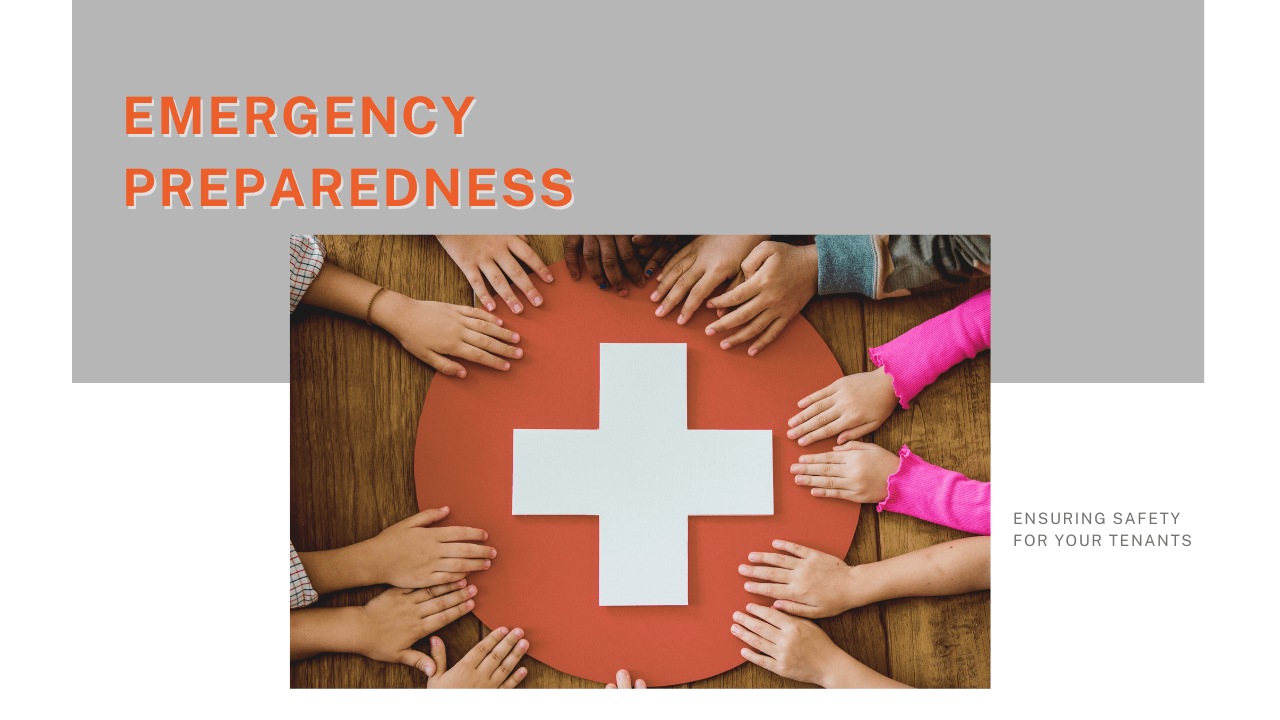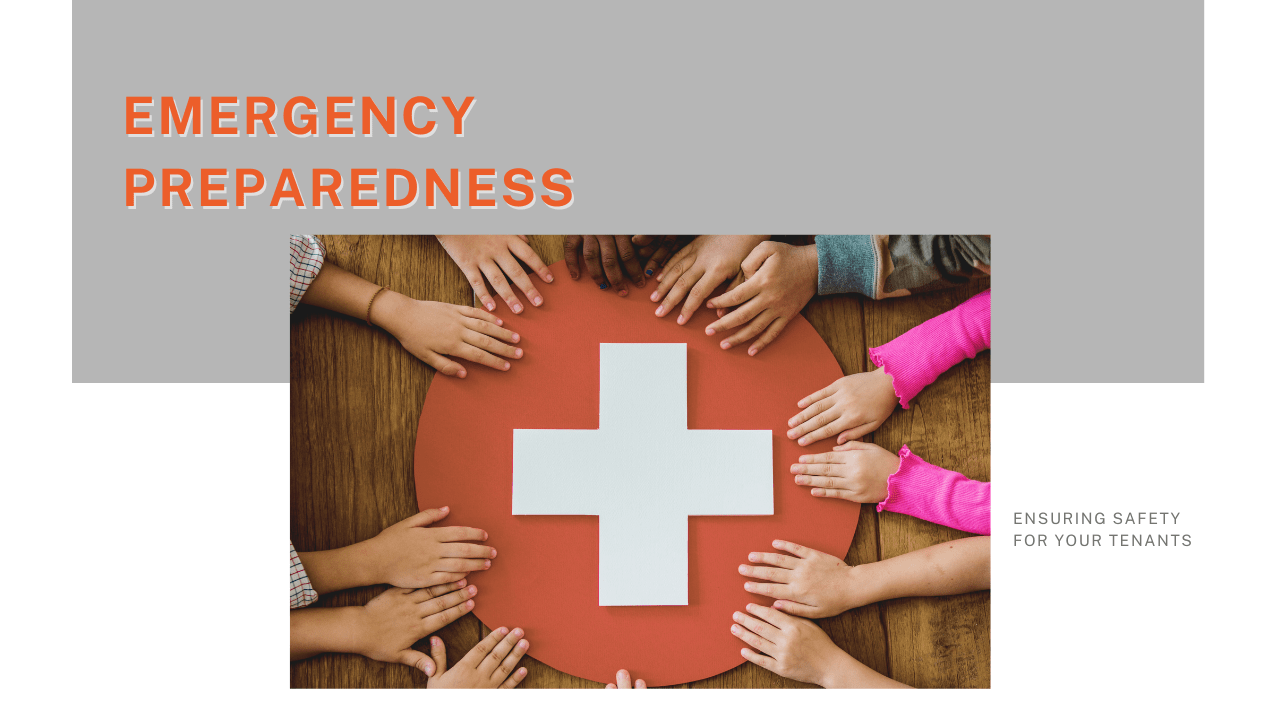
It’s unnerving to think about emergencies and threats. But, pretending there’s not a risk is no way to manage an investment property. The safety and security of your tenants must be a top priority, and you also have to be thinking about the security of your property. How would you handle a massive storm or a fire or a break-in? Emergencies, whether caused by natural disasters, accidents, or unforeseen crises, can happen at any moment. Being proactive about emergency preparedness is not only a sign of good property management but also a way to build trust and maintain a strong relationship with your tenants.
As Atlanta property managers, we are thinking about worst-case-scenarios all the time. And we have some thoughts that will help you understand the key steps to improve emergency preparedness, ensuring tenant security and property protection in any situation.
Let’s get into it.
Why Emergency Preparedness Matters
Emergencies can be anything. In Atlanta, we’ve seen tropical storms refuse to weaken after hitting coastal cities, causing massive flooding and wind damage. We’ve seen unexpected snow and ice events. There are risks associated with severe heat, and there might also be gas leaks and power outages. Pandemics.
Without a solid plan in place, these situations could lead to property damage and liability issues. Worse, they could endanger the lives and safety of your tenants.
By developing and implementing an emergency preparedness plan, you can:
Mitigate risks
Provide clear instructions to tenants
Demonstrate your commitment to their safety
This not only improves tenant retention but also enhances your reputation as a landlord.
Steps Atlanta Rental Property Owners Can Take for Emergency Preparedness
Not sure where to get started? Reach out to us at Property Services of Atlanta, and we can provide you with a customized approach to emergency management. We can talk about our risk management strategies, too. You’ll also want to get started with these immediate steps:
1. Assess Potential Risks
Begin by identifying the most likely emergencies in your area. For instance, it’s unlikely that Atlanta will ever be a direct hit when it comes to hurricanes. However, we are in the path of potentially harsh tropical weather, so plans should be in place during hurricane season to deal with heavy rain. There may be an uptick in tornadoes over the summer. Fire safety should be a concern anywhere, and it helps to be prepared for power outages and public health crises.
Create a checklist of risks specific to your property location, and address potential vulnerabilities. It’s always better to be over-prepared than surprised by a threat you did not see coming.
2. Put Together an Emergency Plan
An emergency plan is essential to tenant security. It also protects your property from the risks that could do harm to tenants or the entire community. A thorough emergency plan will include:
Evacuation routes for each unit and the building as a whole. If your tenants in a single-family rental need to quickly leave the neighborhood, make sure they know how and where to go.
Procedures for contacting emergency services and shelters. Who are the first responders near your property? You’ll want their contact information.
Locations of safety features like fire extinguishers, first-aid kits, and shut-off valves for gas and water. This should be part of the orientation that tenants receive when they move into your property, but it’s a good idea to gather this information into a separate emergency plan, too.
Tenant communication protocols during emergencies.
Ensure this plan is readily available to all tenants and maintained. Keep contact information and instructions clear and up-to-date. Provide a physical copy and a digital copy so tenants can easily access it when needed.
3. Provide Clear Communication Channels
Emergency situations require fast, reliable communication. This is one situation in which over-communicating may not be a bad thing. Keep in constant contact with your residents. Use technology such as text alerts, email notifications, or property management apps to inform tenants about emergencies in real time. If the emergency disrupts internet connections, you’ll need to rely on old fashioned phone calls. Have those phone numbers at the ready. Ensure you have an up-to-date contact list for all tenants and provide them with your contact information for emergency situations.
Working with an Atlanta property management company? That’s smart. Make sure you provide them with all of your contact details. You’ll have a lot less to worry about if an emergency occurs and a management team is in place, but you’ll want to be informed as things change.
These are the three most important steps you can take to ensure you’re prepared at the most basic level for any emergency that might occur. Now, let’s talk about how you can protect your property and enlist help from your tenants when it comes to keeping them safe.
Install and Maintain Safety Features in Atlanta Rentals
Make safety a part of your property’s infrastructure by installing essential safety features and ensuring they are regularly maintained. Key installations for your property will depend on whether it’s a single unit, an entire building, a single-family home, or a condo. Any property, however, must include:
Smoke detectors. There must be at least one smoke detector on each floor of the property, including the basement, except for the attic unless it's used as living space. Smoke detectors should be mounted on the ceiling or wall in a central location in the corridor or area that leads to the bedrooms. Smoke detectors must be listed and meet the specifications of the NFPA 72. They should be replaced every 10 years.
Fire extinguishers. In Georgia, landlords are required to provide a fire extinguisher in either the common areas of a rental property or in the individual apartment unit. Fire extinguishers must be tagged by a State Certified contractor and re-certified every 12 months.
Carbon monoxide detectors. These need to be in all rental units with a carbon-based-fueled appliance or device that produces by-products of combustion, or an attached garage.
Emergency lighting in stairwells and exits.
Regular maintenance checks are critical to ensure these features function properly when needed.
Educate Your Atlanta Tenants
A good relationship with tenants will make protecting them and your property a lot easier. Providing tenants with safety education can make a significant difference during emergencies. Create opportunities to share knowledge by hosting annual safety briefings or workshops. You also want to distribute resources like emergency guides and checklists. Post evacuation routes and fire safety tips in common areas when you’re renting out a multi-family space.
Proactive education empowers tenants to act quickly and appropriately when emergencies occur. There will always be panic when something unexpected and devastating occurs, but if you can minimize the chaos, you and your tenants and your property will be in much better shape.
The necessary partnerships are not only with your residents. It’s also important to collaborate with local fire departments, police, and emergency management agencies. These partnerships can provide access to resources, training sessions, and professional advice on enhancing your property’s emergency preparedness.
We have referenced the importance and the value of a professional property management partnership, and knowing that experts are taking care of the planning and responding to emergencies can provide owners with a lot of peace of mind. If you’ve ever considered a property management partnership, this is an excellent reason to do it.
Invest in Insurance and Keep Policies Up to Date
Emergency preparedness isn’t complete without proper insurance. Landlords should ensure their property is covered for potential disasters, and tenants should be encouraged to obtain renters insurance for their personal belongings.
Conduct a complete review of your coverage when you’re thinking about preparing for emergencies. Do you have loss of rent coverage? This could be important if a disaster forces your tenants to move out of the property. If you’re in a flood zone, make sure you have adequate flood insurance, which is separate from your general policy.
Building Tenant Trust Through Preparedness
 Ultimately, emergency preparedness is about showing your tenants that their safety is a priority. By implementing safety measures, maintaining clear communication, and educating tenants about emergency protocols, you demonstrate your commitment to their well-being.
Ultimately, emergency preparedness is about showing your tenants that their safety is a priority. By implementing safety measures, maintaining clear communication, and educating tenants about emergency protocols, you demonstrate your commitment to their well-being.
This not only provides more protection and peace of mind during emergencies, but it also contributes to better tenant retention. When your Atlanta tenants feel secure and protected and they’re enjoying a fantastic rental experience, there’s no need to look elsewhere when the lease is ending. They’ll be happy to renew, saving you from the expense and the stress of turning over the property.
Preparedness creates peace of mind—for both your tenants and you, as a landlord. A safe and secure property will not only minimize risks but also enhance tenant retention and your reputation.
This has been general advice for anyone with a property for rent in Atlanta. Let’s customize what we talk about when we talk about emergency planning. Contact us at Property Services of Atlanta, and we’ll discuss your tenants and your property and how to keep them safe.

 Owner Portal
Owner Portal




